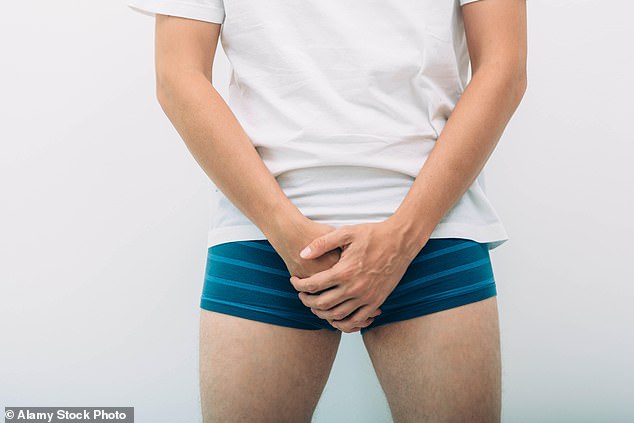A&E departments have seen a rise in the number of patients attending with broken penises and other sex-related incidents this year.
Tens of thousands sought help removing a ‘foreign object’ from intimate areas, NHS data showed.
More generally, ‘problems’ with the penis and vagina have jumped by a third within a year.
More people went to emergency departments after contracting sexually transmitted infections and for problems including prolonged erections, analysis revealed.
It forms part of a growing trend of patients with more unusual conditions presenting at the country’s emergency departments – including an eight-fold rise in people suffering from suspected caffeine poisoning.

NHS data shows there has been an increase in men and women needing treatment for injuries sustained during sex (stock)
The rise in coffee culture saw 142 people seek help for caffeine toxicity in 2022/23, compared to just 18 the year before.
Meanwhile, illnesses thought to be eradicated in the UK – such as smallpox and typhoid fever – also rose from seven and 94 cases in 2021 to 50 and 215 respectively last year, though likely contracted overseas.
Medical leaders said it was more evidence of how busy A&E departments are, typically seeing more than a million patients every month.
Dr Tim Cooksley, president of the Society for Acute Medicine, said: ‘This data further shows the diversity of presentations that NHS teams manage every day.
‘Fundamentally, these patients have urgent conditions that need timely, respectable care and, as for so many patients currently, this cannot be achieved in overwhelmed urgent and emergency care environments which are extremely distressing for patients.’
On average, 45,000 people visit major hospital A&E departments every day in England, with a further 24,000 people using minor A&E facilities like walk-in-centres and minor injuries units.
A recent NHS report found attendances at major departments are 16 per cent higher than they were ten years ago, with reasons including poor GP access, mental health and the growing NHS waiting list often blamed.
Latest analysis of NHS figures suggest attendances for delicate issues are rising at a faster rate, with those with penis problems up 34 per cent from 13,911 to 18,592 last year while 20,675 women needed help with ailments linked to the vagina, a 30 per cent rise on 15,930 in 2021/22.
In the last 12 months, 73,300 patients had a procedure to remove a foreign object after attending A&E.
While these figures will also include removal of objects in orifices including eyes, noses and ears, the data shows that there were 1,502 attendances for ‘foreign body in rectum’ and 5,421 people attended due to a ‘foreign body in the vagina’.
Some 373 men needed help for priapism – a prolonged erection of the penis, up from 342 in the previous 12 months and 272 in 2020/21.
Men are urged to seek urgent medical care if the condition lasts for more than two hours to ‘avoid permanent damage’ if home treatments such as a warm bath or shower, going for a gentle walk or urinating does not work.
A further 432 men presented with a fractured penis, which usually occurs during sex. This was up a quarter up on the previous year.
Doctors also saw a rise in the number of men who sought help for hydrocele – a painful condition where the scrotum becomes filled with fluid, with 2,276 attendances, up from 1,988 the previous year.
The data also shows 1,593 people attended an A&E department in England last year due to bleeding after sex.
Some 2,392 people were treated for micturition syncope – a condition which causes people to feeling dizzy or light-headed, or having short-lived loss of consciousness when passing urine.
Leading emergency doctors said that A&E staff are trained to help people with potentially embarrassing problems with ‘confidence and respect’ and urged people not to put off seeking help when needed.
Dr Adrian Boyle, president of the Royal College of Emergency Medicine, said: ‘People attend A&Es with an array of issues, including some potentially embarrassing problems. Staff are trained to approach these problems confidentially and with respect.
‘It is vital that if patients are concerned about something and feel they need urgent or emergency care, they should come to A&E.
‘We don’t want patients with potentially important problems to feel deterred.
‘Some symptoms may be signs of a more serious problem and coming to A&E may be what is needed to diagnose that and receive the necessary and appropriate treatment.’










